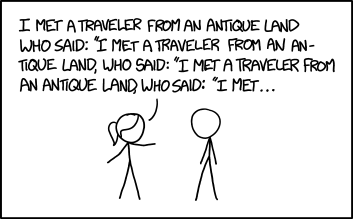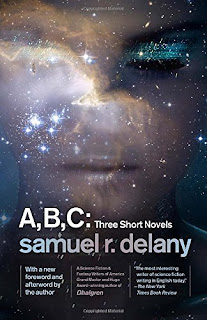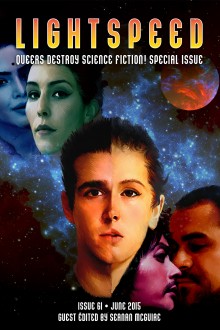- Objections to Fun Home not about trigger warnings.
- Some freshmen object, other like it.
- Brit Mandelo on Tiptree/Sheldon as a lesbian writer
Bi community stuff, programming stuff, fan stuff. Not necessarily in that order. This is a personal blog.
Monday, August 31, 2015
Link Cleanup: August 31, 2015
Saturday, August 29, 2015
Re-adopting Linux: Making the Switch
Choices Choices
One of the things that makes Linux unique is the variety of choices in distribution various groups offered. I had been running various distributions in virtual machines for some time, so I wasn't totally unfamiliar.
Currently I'm working with Xubuntu, a variant of Ubuntu that uses XFCE as the primary desktop environment. Ubuntu has most of the software packages I want in reasonably current versions, has a large number of people banging on it, and is officially supported by Steam. XFCE is a nice, simple, and clean user interface. I have the hardware to run practically any desktop environment but have a fair bit of experience with XFCE under VirtualBox.

I also considered Linux Mint, but the live DVD didn't work well with my video hardware (GeForce 750Ti).
Testing
I used a live DVD to test out Netflix before committing to an install.
- pop the DVD in
- reboot
- download chrome
- login to Netflix
- test with debugging console.
Installation
Installation was very easy. I resized my NTFS partition, then rebooted into Windows 7 a couple of times to run disk checks.
The only real problem I've had is that my USB WiFi adapter has been starting to glitch. I'm almost positive this is a hardware fault because it glitches under Windows 7 as well. I'll get three or four hours of service, then it starts throwing errors. Unplugging and reconnecting the device usually works. A replacement is on order.
Installation was actually easier than setting up the same hardware on Windows 7, where both video and WiFi adapter demanded searching for updated drivers. This included the chicken/egg problem that you need the drivers to have an operating system to search for the drivers. With the exception of the glitchy network adapter, everything has just worked so far.
Friday, August 28, 2015
Linux Revisited Again
She'll be coming 'round the mountain when she comes
— traditional
I seem to be coming back around to linux again, and feel like putting down some of my own thoughts about the decision. While the "year of desktop linux" has been a running joke for the last two decades, I think we're now getting to the point where the decision is less of an issue.
I should probably clarify that my home computer is a home-built Frankenstein built on an installment plan: I buy an upgrade, and I install it.
The Politics: Why not Windows 10?
Privacy. It seems that with Windows 10 that Microsoft has gone opt-out rather than opt-in on certain forms of data reporting. While it looks like a lot of this can be turned off, the recent finding that parental modification was turned on by the upgrade disturbs me. Of course, I'm 44, own my computer, and am not accountable to my parents. But it opens the question about what other kinds of reporting might be turned on as a useful feature by a future update.
Why Linux? The Hobbies
At the moment, two of my hobbies involve writing and programming. In both cases the workflow I prefer to use is slightly better supported on Linux.
Writing
Currently my preferred workflow includes markdown or emacs org-mode and pandoc. Both emacs and pandoc have been ported to Windows but linux remains the primary platform of support. Windows introduces some annoyances to the process.
Programming
My programming hobby involves solving simple puzzles in multiple programming languages. Most of the programming languages I work in have Linux as a primary platform and Windows as a secondary platform. In Common Lisp for example, SBCL offers a bit better features and performance compared to any of the open-source lisps for Microsoft Windows. Working through cygwin for gcc and clang is something I find to be a bit awkward.
There are exceptions. Racket has always impressed me on any operating system. Microsoft has F and C#, but I don't have an investment in learning them.
Question 1: Games?
One of the reasons I went to Windows 7 in building my Frankenstein was access to AAA MMORPG and RPG games. I think that's less compelling to me now than it was previously for a couple of reasons.
The first is that I've had a loss of faith in game design lately. Dragon Age 2 and Mass Effect 3 were huge disappointments. Generally speaking, take away the cinematic cut-scenes and the primary game mechanic involves cutting your way through dozens of dehumanized mobs to get from spawn point to goal. Even Bethesda's Fallout and Elder Scrolls series hinges on boss fights and ambushes to move the story forward. So I'm no longer as interested in playing those games as I've been in the past.
Images via pixelcurious.
And on the other side, Valve and GOG.com have made great strides in bringing new games and back-catalog releases to OS X and Linux. 20 out of 54 of my Steam games have Linux ports, along with about half of my GOG.com titles (including three of the games I've been playing the most this year.) Playonlinux has moved WINE gaming forward a fair bit. It's an area where the last few years have seen a lot of progress.
Question 2: Streaming Video?
Late last year, Netflix got support via Google Chrome, so that's taken care of. Still, a big test before install involved watching videos through a liveCD.
There's Always Dual-Boot
And if all else fails, I'm not burning any bridges by dual-booting.
Thursday, August 27, 2015
Notes: Fun Home, Republican Fibs, and a Party of Losers.
Fun Home: Some incoming Duke University freshmen object to Fun Home as an entirely optional reading. Eliel Cruz responds:
This bubble of ignorance that conservatives live in when they treat LGBT stories as “other” isn't just bad for academics, however—it’s also dangerous to our country's ongoing struggle for equality. Excluding LGBT people from one’s worldview means it’s easier to see them as less than deserving of empathy—or less than human.
Ted Cruz gets it wrong. Sgt. Phillip Monk wasn't fired:
One military training instructor who worked for me and counseled young airmen told them: “Homosexuals were the downfall of Rome, and now they’ll be the downfall of the military, and the military will fall because of their lust and greed.” About 13 trainees filed a complaint against him. Those complaints went straight to my boss, who told me we had to do something about it.
I went to legal, and legal said, “You have to do something about this.” We had a zero tolerance policy on discrimination. I went back to my staff and told them. Monk said, “He’s got freedom of speech!” But we had to discipline the instructor. It wasn’t even a huge punishment. It was a warning.
Monk was up in arms. He came to me and said, “You know, ma’am, I can tell we’re not gonna agree on this. My replacement is already coming in. Do you mind if I take leave while this happens?” I said, “Sure, it’s your prerogative.” He walked out of my office, filled out the paperwork, gave it to me, and I approved.
George R. R. Martin tells his side of the Hugo Losers Party:

Wednesday, August 26, 2015
Windows 10 turns Parental Monitoring on by Default
"This weekend we upgraded my 14-year-old son's laptop from Windows 8 to Windows 10. Today I got a creepy-ass email from Microsoft titled 'Weekly activity report for [my kid]', including which websites he's visited, how many hours per day he's used it, and how many minutes he used each of his favorite apps."
Useful feature for parents, boo for making it a default settings change.
Monday, August 24, 2015
Tiptree at 100
August 24 would be the 100th birthday of Alice Sheldon, aka James Tiptree, Jr. aka Raccoona Sheldon.
Sunday, August 23, 2015
Naming the Love that Dares Not Speak It's Name
Just because you're writing about bisexuality in a science fiction and fantasy context doesn't mean you have to use the word explicitly. "Bisexuality" comes to us via a Victorian context of medicalization and psychoanalysis. If we can imagine dragons, we can imagine worlds where that never happened. Some examples:
Ancillary Justice and Ancillary Sword: From the perspective of the cyborg protagonist, gender is an uncivilized social convention. As such, sexual relationships are defined more by the ways in which they do or do not involve the caste system of her (self-applied pronoun) culture.
Door into Ocean: Primarily a mono-gendered and mono-sexual culture. However male outsiders are absorbed into the primary culture of Shorah.
The Broken Kingdoms and The Kingdom of the Gods: Nahadoth's gender-fluidity is clearly described, as is the triad sexuality among Nahadoth, Itempas, and Yeine.
The Mirror Empire: Describes a five-gendered cultured with polyamorous relationships across all five genders.
An SF&F work doesn't have to use the words gay, lesbian, or bisexual in order to provide us with radical visions of those realities.
Hugo Awards
Last night discussed how this nonsense has brought fandom together in a big way. Puppies are like the giant squid fr Watchmen #HugoAwards
— Arthur Chu (@arthur_affect) August 23, 2015John C Wright has lost six Hugos in one night making him the most efficient loser in Hugo history #HugoAwards
— Arthur Chu (@arthur_affect) August 23, 2015Winners: Lightspeed (semi-pro zine), Julie Dillon (artist), Ms Marvel Vol. 1 (graphic story), Orphan Black (short-form drama), The Dalek (presenter), Guardians of the Galaxy (long-form drama), Three-Body Problem (novel).
Saturday, August 22, 2015
Infinite Crisis on Infinite Darkseid
Two on bi men and femininity
Two on bi men and femininity. First: I'm a male, cross-dressing bisexual, married to a woman.
Second: Eliel Cruz and friends:
Wednesday, August 19, 2015
Ariah
I can tell you that Ariah embodies the true potential of Bildungsroman in terms of the protagonist’s journey to adulthood, and that its intelligent, powerful, emotive discussion of gender, sexuality, culture, racism, imperialism, language, family, love, autonomy and personhood, among other things, is evocative of the best aspects of both Katherine Addison’s The Goblin Emperor and Ann Leckie’s Ancillary Justice. That these books have been nominated for, and won, some of the most prestigious awards in the field should, I hope, convey my full meaning: that Ariah deserves a place among them. But none of that tells you how it made me feel.
Monday, August 17, 2015
Bi News: Weekend Stuff

Half of adults in Great Britain between the ages of 18 – 24 describe themselves as not exclusively heterosexual according to a YouGov poll.
More women are identifying as bisexual, fluid, or no-label on dating site Her.
Tuesday, August 11, 2015
Two Puzzles
Two puzzles, one solved.
First: Help Us Decipher This Inscription - Medieval manuscripts blog
+NDXOXCHWDRGHDXORVI+
Second: Mathematicians discover a new way to tile pentagons (but not The Pentagon.)
Canids being Canids
A lot of people are thinking the dog is dumb for walking around with a box in front of its face.
But you see, we are the dummies, because the dog has his box, and for those few minutes, while the dog has his box, everything is as the doggie world should be, because the dog has his box. And all other things such as trees, walls, and tires are just tears in the rain, compared to the relationship between the dog, and his box, and the box and the dog.
At least until the squeaky not-a-rat toy shows up. That jerk.
Speaking of dogs:
Today on the Sun
Discovering Solar Dynamics Observatory daily video feeds.
Friday, August 7, 2015
American Truck Simulator trailer
No plot? No problem!
I am taking a bit of a conscious break from the standard RPG storytelling method/mechanic of addressing problems through mass violence. I don't regard this as inherently bad, just bad for me at this time. Although there are some interesting experiments in narrative.
Thursday, August 6, 2015
Eliel Cruz writes about femininity and bisexual men
There are spaces for gay men, lesbian women, bisexual women, and trans women to express femininity. There are few, if any, arenas in which bisexual men, queer in our own right, have the space to express femininity without fear of our sexuality being nullified. There is a deeply ingrained misconception that a man can’t be romantically involved with another man and still be interested in women as well. That is because masculinity, or at least the most basic stereotype of it, is meant to be dominant and to attract femininity. Femininity, on the other hand, is weak and attracts masculinity. Male bisexuality, even when it is embodied in a traditionally masculine person, already blurs the lines between those outdated and severely limiting misconceptions. Add femme behavior, and you’ve really got a problem.
— Eliel Cruz on Bisexuality and Femininity for men
Also on Slate:
Wednesday, August 5, 2015
Three from Delany
Delany is having a busy month with a new edition of three early novels and a homage anthology. So, he's giving more interviews.
In the contemporary science-fiction scene, Delany’s race and sexuality do not set him apart as starkly as they once did. I suggested to him that it was particularly disappointing to see the kind of division represented by the Sad Puppies movement within a culture where marginalized people have often found acceptance. Delany countered that the current Hugo debacle has nothing to do with science fiction at all. “It’s socio-economic,” he said. In 1967, as the only black writer among the Nebula nominees, he didn’t represent the same kind of threat. But Delany believes that, as women and people of color start to have “economic heft,” there is a fear that what is “normal” will cease to enjoy the same position of power. “There are a lot of black women writers, and some of them are gay, and they are writing about their own historical moment, and the result is that white male writers find themselves wondering if this is a reverse kind of racism. But when it gets to fifty per cent,” he said, then “we can talk about that.” It has nothing to do with science fiction, he reiterated. “It has to do with the rest of society where science fiction exists.”
Interview with SciFi Signal part 1:
In 1962, the idea of starting off a science fiction novel with an adolescent girl in the middle of a discussion of Da Vinci and Christianity contrasted with Buddhist iconography, against a background of renaissance art history, atomic devastation, and political atrocity, was a way to alert a reader to something a little unusual, and—indeed—that it might be something you had to dig for a bit.
I don’t think it necessarily works that way today. I suspect the closest that the current three- and four-star Amazon reviewers will get is to wonder if this has anything to do with the stuff the various puppies in their several emotional states might have been on about last year—and they would probably be a little surprised that the answer was, “Yes, it actually does,” only not in the way they are used to, so that, as they go on, it doesn’t strike them as terribly interesting. Now I’m the last person who can complain that they’re in any way mistaken. But a few readers who are interested in either writing or the genre’s history may find something there to think about.
The extended answer to the last question discusses Gay ideolects
So now I’m ready to answer you last query as directly as I can, “What kind of question are you never asked”: To which my answer is, “There are a set of questions that always seem to me to be—or at least to begin—as aesthetic bad manners, and, yes, I balk at them, even as I eventually—once I watch others start to come to terms with them—try, indeed, to do so myself. They get their impetus from someone taking the easy way out. The way I learned to adjust comes largely form the street—as well as from summer camp. In summer camp, largely from the white kids around me, I learned to curse. “You taught me language, and the profit on’t is I know how to curse.” And a fouler mouthed bunch of kids you couldn’t find. And in Harlem, on the black ghetto streets where my black friends taught me a whole other set of “bad words” which we used just much as the hip-hop kids today—nigger, and all the other ethnic slurs, though the ones reserved for us clearly were the most powerful. (As they are today.) Harlem was a crowded and condensed neighborhood, and people—all sorts of people—lived shoulder to shoulder. Though I went to school on the very white East Side, I lived in the black ghetto. And by the time I was six, seven, or eight, I knew there were a fair number of men who would come out dressed as women, wearing make-up and nail polish—and my best friend on the street, Johnny, a black kid who lived with his mother but who had no father, as two or three of my friends didn’t, was mad to wear nail polish and lipstick so that, to keep the peace, sometimes his mother would let him. I thought it was strange, but he was smart and fun—and so we were the two who ran away from home together . . . when we were six.
...
Those languages subgroups are good to use to face the parts of the world that folk don’t want to face. At least I’ve found all of them a help.
My mother was the one who told me: “Sticks and stones can break your bones, but words can never hurt you.” Well, yes, they could—but that is when other people took them more seriously than, perhaps, they should have. But soon I had words to use in the same way that the kids in the summer camp, the black kids on the street, and the only slightly older black transgendered young people (who most mistook for gay) used them. I still do, today even more—all three. Those were the idiolects I thought in (first) and tried to speak in as a child. (And sometimes just practiced the transgender one, in the privacy of my imagination: no, I had no one actually to use it with. Johnny, by now, had moved out of the neighborhood and probably the city. Those are the languages I did not dare mix until I became an adult—on paper as much or more than in the air. The ironies each have at their disposal allows each to do things the others can not. Add to them the range of accepted analytical language, and the music of that linguistic quartet is a great part of what an American writer might be.
Monday, August 3, 2015
Charon Names: Star Trek, Star Wars, and Octavia Butler

The New Horizons team the first map of named Pluto and Charon features to the IAU. The IAU has final approval over the names, but they set the categories so I don't see a problem.
Craters (Fictional Explorers)
- Kirk
- Spock
- Sulu
- Uhura
- Skywalker
- (Leia) Organa
- Vader
- Alice
- Nemo
- Kaguya-Hime
- Nasreddin
- Ripley
Mons (Authors)
- Clarke
- Butler
- Kubrick
Chasma (Fictional Ships)
- Marcoss
- Argo
- Nostromo
- Serenity
- Tradis
Queers Destroy Science Fiction
The Queers Destroy issue of Lightspeed has been released and is available as trade paperback and ebook.
Brown Dwarf Aurora

(artist's rendition)
Hallinan discovered in 2006 that brown dwarfs can pulse at radio frequencies, too. This pulsing phenomenon is similar to what is seen from planets in our solar system that have auroras.
Powerful Auroras Found at Brown Dwarf | NASA
A phenomenon used to brilliant effect in Peter Watts's Blindsight.
Sunday, August 2, 2015
APOD: Stripped Galaxy

A distant galaxy is stripped of gas as it collides with a supercluster. Hubble image via APOD
Revisiting Chasing Amy
I can't figure out a pull quote from this one, so I'll leave it at Society’s Bisexual Hangups: How Chasing Amy Is Still Ahead of Its Time at the Mary Sue
Saturday, August 1, 2015
My Name is N/The Swede, and other links
A few years back, a US literary agent considered making a first attempt to sell My Name Is N to American publishers. (The book is titled The Swede in the US.) But the agent hesitated, saying the mainstream crime fiction market couldn’t stomach a gay male hero. She suggested that I rewrite the book to make the protagonist straight.
I thought seriously about it. But in the end, I decided to be true to the man I based my protagonist on. Hugh Swaney was a legendary homicide detective on the US west coast. I’d spent a week interviewing him, taking notes on his life and work as he was dying of Aids. He was the toughest man I’ve ever come across (including many in the special operations community I’ve met over the course of my military career).
— Robert Karjel comments on negative reviews regarding the bisexuality of his protagonist for My Name is N. (Guardian)
Also:
- A reason why I'm a bit nervous around police. Gay man dies in custody after being denied medication. (Advocate)
- The true meaning of the word cisgender (Advocate)
And this is why I don't do Marvel: Hercules
When asked about previous hints of bisexuality and an alternate Hercules' romantic relationship with an alternate Wolverine in the 2012-2013 "X-Treme X-Men," series, Alonso responded, "Hercules and James Howlett’s relationship in 'X-Treme X-Men' took place in a unique alternate universe, similar to how Colossus was gay in the Ultimate Universe, but is straight in the 616. Same goes for Hercules here."
And this is why I don't do Marvel. (Marvel Addresses "Hercules'" Sexuality - Comic Book Resources )













